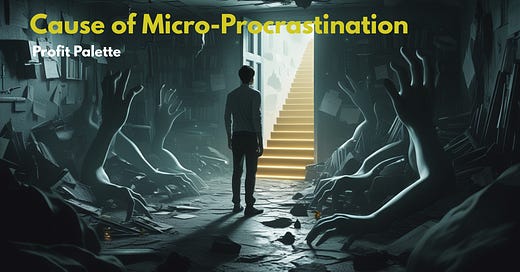Surface-Level Causes
Task Underestimation: You tell yourself, “It’s just a 5-minute thing, I’ll do it later”, but you repeat that endlessly.
Comfort Prioritization: The brain seeks pleasure and avoids effort. Even small tasks feel like interruptions.
False Completion: You think about doing it so clearly that your brain feels like you already did it.
Low-Stakes Illusion: Because the task feels non-urgent, the consequences don’t feel real — until they pile up.
Perfection Paralysis: You subconsciously delay starting because you want the perfect conditions or execution.
Common Behaviors:
Making to-do lists but never executing them.
Constantly rewriting plans, strategies, and ideas.
Saying “I’ll just do it after…” (after lunch, after this video, after this message).
Feeling oddly productive by thinking instead of doing.
Keeping tabs open, notebooks full, or unfinished projects everywhere.
What’s Happening in the Brain?
Neuroscience Behind Micro-Procrastination:
Prefrontal Cortex: This is your planning and logic center — it knows what needs to be done.
Limbic System (specifically the Amygdala): This is your emotion and fear center — it reacts to effort, stress, discomfort.
When you think about a task, even a small one, your brain triggers emotional discomfort about effort or failure. The amygdala sends a “let’s avoid this” signal, even if it’s irrational. So your brain quietly pushes it aside.
Dopamine Plays a Role Too:
Doing a task = delayed reward.
Avoiding the task (like scrolling or watching) = instant dopamine.
Micro-procrastination happens because the brain favors the short-term hit over long-term gain.
And what about that paradox?
Why do I feel so sure I can do it, and no one else can — but still delay it?
That’s Ego-Confidence + Action-Paralysis.
You know your potential — and that’s the trap. Your brain goes: “Since I CAN do it, I don’t need to do it now.”
It creates an illusion of control, which delays action. That false security creates inaction.
Inner Mindset Behind Micro-Procrastination
You’re spot-on: this is not just behavioral — it’s spiritual.
Mindsets of the Micro-Procrastinator
Introverted Builders: They think deeply, design before acting, and reverse-engineer success. But because their power is mental, the physical execution feels like a second act, not the first.
High Standards: They feel that the work needs to be “worthy” of their plan, their name, their ideal. If conditions don’t match, they hide it.
Inner Critic: Deep down, there’s a subtle fear — “What if it’s not as good as I imagined?”
Spiritual Block: The person confuses readiness with perfection. Spiritually, they lack surrender. They’re waiting for the ideal moment, instead of trusting movement.
Spiritual Beliefs That Fuel This:
I need to be perfect before I begin.
If I wait, the right moment will come.
My plan is so good, it doesn’t need rushing.
The world isn’t ready for what I’ve built yet.
These are ego-wrapped insecurities. They wear the mask of wisdom, but in truth, they stall your growth.
If this resonated with you… And you want more thoughtful, mindset-driven, high-value content twice a week — 👉 Support my work on Patreon for exclusive full posts. 👉 Or get free updates via Substack.
Breaking Micro-Procrastination — A Deep, Practical Guide
Imagine this as your personal plan to transform quiet delay into conscious action.
The 1-Minute Movement
Every day, pick one task that you’ve delayed. Do just 1 minute of it — even if it’s simply opening the file or typing one sentence.
The brain resists starting, not continuing.
Once you begin, the resistance drops.
Build the “Ritual of Start”
Don’t wait for motivation. Create rituals to begin:
Light a candle, start a timer, open your workspace — make it sacred.
Use a mantra: I respect my ideas by acting on them.
Replace Thought with Movement
Your brain is addicted to thinking — so interrupt it with small motion:
Instead of rewriting your plan, write the first line of action.
Instead of imagining the message, send a draft.
Keep a “Thought → Move” notebook. Anytime you catch yourself thinking, ask: what’s one move?
Honest Reflection
Ask yourself:
What did I delay today that took less than 10 minutes?
Why? What story did I tell myself?
Was that story true — or just comfortable?
This builds awareness muscle, which is the enemy of micro-procrastination.
Dust to Done — Day
Pick a day (e.g. Sunday) where you:
Go through old plans, drafts, notebooks.
Choose one item each week to finish or publish.
Call it your “From Dust to Done” challenge.
It trains you to release hidden ideas into action.
Spiritual Reframe
Start telling yourself:
Ideas are not mine to keep — they are mine to complete.
Silence is not safety — it’s a slow forgetfulness.
Starting is an act of faith, not certainty.
When you release the need for ideal timing or mood, you reclaim the power of motion.
You are not lazy. You are someone whose ideas carry weight. And that’s why they scare you to move. But remember: Thoughts are seeds. But only actions bear fruit. You don’t owe the world a perfect plan. You owe it your first step. And then the next. And then the next.



